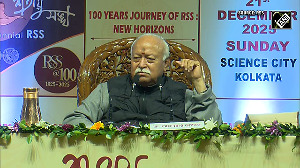It took me some time to go through the 30,000-word
mid-term review of the monetary policy released on October 24. I must confess that I did not go through it word by word, but the wide gap between the policy statement and what the central bank did just a week later is very noticeable.
Coming back to the review, it has too many numbers followed by clichéd arguments, with very little qualitative analysis and discussion of specific points. I will confine myself to quoting only a few:
Take inflation. The review says that "it will be the Reserve Bank's endeavour to bring down inflation to a tolerable level of below 5 per cent at the earliest, while aiming for convergence with the global average inflation of around 3.0 per cent over the medium-term." Surjit Bhalla, my co-columnist in this newspaper, has argued, quite convincingly in my view, that it is conceptually wrong to compare our wholesale price inflation, with the consumer price inflation in other countries; that the comparison should be with the producer price inflation, which is in double digits in many countries of the world. What comparisons is the RBI making?
Take the question of money supply. I quote "The Reserve Bank's policy endeavour would be to modulate the monetary overhang generated by the sustained expansion of money supply
This could also mean curtailing liquidity if the recent liquidity easing measures are seen to have injected excess liquidity, thereby stoking inflationary pressures." Eight days later, the central bank relaxed the monetary policy!
Take, again, the increase in bank credit, which amounted to 29.4 per cent in the 12 months to October 10, prompting the comment, "such a rapid rate of credit growth is a cause for concern and will warrant intensified monitoring and continued correction." No discussion or even nodding recognition of the real problem - namely the non-roll over, in effect withdrawal, of short term foreign credit to Indian importers, exporters and bank branches abroad, of the order of $70 billion. To quote Dr Montek Ahluwalia (The Indian Express, October 27), "The real problem is that non-bank credit has shrunk. Many of the corporates that used to borrow abroad, let's say external commercial borrowing, because of the choking of credit in the rest of the world, are not able to roll over their external commercial borrowings. All of a sudden they have to come and get the money in the domestic market. Secondly, trade credit, suppliers' credit - people who are financing imports - availability of that credit has really shrunk. So, banks are in quantitative terms doing pretty much what they are supposed to. But the non-bank system is choked." This issue has been commented upon by your columnist since as far back as 1996, and was also flagged in both the reports on capital account convertibility. Yet, the central bank seems immune to realising the implications of the issue for both the exchange market and banking liquidity. Such inconsistencies and issues significantly weaken the RBI's credibility and prestige, and hence its ability to alter expectations: Even otherwise, the central bank's weight is being undermined by the series of announcements about interest rates, and even exchange rate policy, emanating from New Delhi.
On another recent issue, the central bank has hardly added to its reputation as a banking regulator, as manifested in the treatment of banks' claims on clients arising from derivatives contracts. On October 13, it issued a directive on the treatment of "overdue payments in respect of derivatives transactions". These need to be treated as NPAs and also make "all other funded facilities granted to the client as non-performing asset." This directive was promptly changed on October 29th, on the latter issue. Such "about turns" surely reflect poorly on the banking regulator.
The US Elections: The apprehensions expressed by me last week about race significantly influencing voting in the US Presidential Election, have proved unfounded with the election of Obama. (Not that racism was totally absent in the voting pattern: 95 per cent blacks and 66 per cent of Hispanics voted for Obama, while a large majority of white males voted for his opponent). One admires the American people for having elected a half-black, barely in his mid 40s, with a strange name (and that too with "Hussein" in the middle), one who started life with few advantages; this clearly proves that, whatever else it may be, the US remains a land of opportunity - and a meritocracy, exceptions like Bush notwithstanding.
What a stark contrast with the oldest political party in the largest democracy in the world not willing to accept anybody not from The Family, as its president! But why criticise that party alone? Too many other political parties have dynastic leadership - and too many of us still advertise for "fair" brides. When will we change on both the issues? On a different plane, even Colonel Gaddafi, the most radical leader from the African Continent, has made up with the US, but our Lefts' visceral hatred of Uncle Sam continues.






